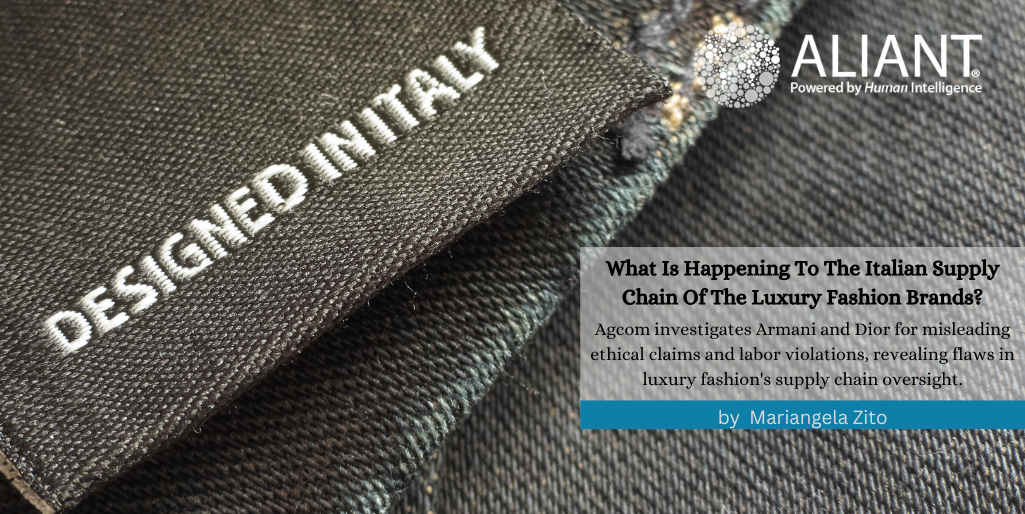On 17 July, Agcom [the Italian Competition and Market Authority] opened an investigation “for alleged unfair commercial practices against companies in the Armani and Dior groups”. From the Authority’s press release it is stated that the companies are suspected of promoting untruthful ethical and social responsibility statements regarding working conditions and compliance with regulations at their suppliers. On the contrary, they would use factories employing underpaid workers, with inadequate health and safety conditions and excessive working hours, despite proclaimed standards of craftsmanship excellence in the production and sale of fashion items and accessories, in violation of the Consumer Code.
The preliminary investigation followed the investigation conducted by the Public Prosecutor’s Office and the Court of Milan, which led to the adoption of three decrees (respectively: January 2024, April 2024 and June 2024) ordering the measure of judicial administration pursuant to Article 34 of Legislative Decree 159/2011 for negligent facilitation of companies operating in the luxury fashion sector (Alviero Martini, Armani, Dior, the latter owned by the French luxury holding LVMH).
What emerges from the orders is that the luxury fashion brands involved have flawed internal audit systems and inadequate controls over the production chain that facilitate labour exploitation and unfair trade practices, even though – at least in the case of the Italian suppliers of the French luxury holding company – the 2017 Loi sur le devoir de vigilance requires the parent company to adopt and manage a prevention plan, as well as to regularly assess suppliers, subcontractors or subsidiaries and provide for a system to monitor the implementation of the measures and assess their effectiveness.
The investigation is in line with what I discussed in my doctoral thesis last June. In particular, from the analysis of the structuring of value chains in the textile-clothing sector and of the two production models of fast fashion and luxury fashion, it emerges that even in the more regionalised production segment of “alta moda“, unfair practices and violations of human and workers’ rights can occur. The latter is characterised by limited production volumes, high manufacturing, production entrusted to small production units and high sales prices; and when luxury brands decide to outsource production to subcontractors or artisans, unbalanced business practices are established since it is the client company that imposes terms and conditions for supply, subcontracting levels, requirements, tariffs, as well as demanding exclusivity in exchange for work continuity.
Mainly, the production of haute couture garments is carried out in Italy and Europe, although more recently luxury brands, as a result of reshoring practices, have decided to relocate the more labour-intensive and lower value-added phases of the production cycle to Romania, Bulgaria, Albania or Serbia, and to the Southern Italy. Despite the existence of a more favourable European regulatory framework and good unionisation, the impossibility of tracking individual production units renders existing protections ineffective. The complexity of the production system in the fashion sector therefore requires effective tools for the management of varied and complex supply chains, whether global or regional, starting with transparency and traceability mechanisms that make customers responsible right to the last links in the value chain and allow social control of the respect for human rights at work and the environment.
Among the ‘negotiated’ regulation instruments adopted by the social partners for the protection of workers in the global supply chain, the Global Framework Agreements (GFAs) are useful tools for the adoption of sustainable and regulatory governance models between the group and the subsidiaries, up to and including the entire value chain; tools which are promoted by the Due Diligence Directive (CS3D) itself on the implementation of the duty of vigilance by multinational companies.
FOLLOW US ON LINKEDIN
SEE MORE ALIANT INSIGHTS


